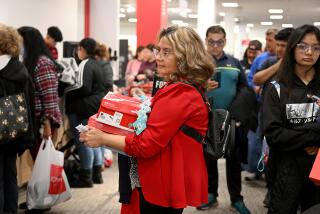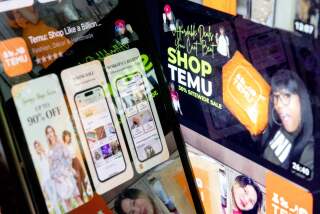China’s version of Black Friday — the world’s biggest shopping day — is expected to surpass $20 billion in sales
- Share via
Reporting from BEIJING — Huang Yinyin, a reporter based in Hong Kong, bought a $120 space heater for $40.
He Wei, a stock trader, bought a $440 air purifier, and got a $300 vacuum cleaner for free.
Xie Pu, a technology columnist, plans to buy up to $3,000 worth of winter clothes, socks, laundry detergent, furniture and toilet paper. “We didn’t even finish the toilet paper we bought last year, but will buy more tonight,” he said.
Friday is China’s Singles Day, the world’s biggest shopping day — an annual Nov. 11 commercial extravaganza in which Chinese consumers spend big on discounted merchandise online. The statistics are staggering: This year, analysts expect Singles Day retail revenues to surpass $20 billion, shattering last year’s record $14.4 billion. (By comparison, last year’s Black Friday brought in $2.72 billion in e-commerce sales and just over $12 billion in total sales over two days.)
The Chinese e-commerce giant Alibaba’s logistics network expects the holiday to generate 1.05 billion packages.
So what is this holiday, where did it come from, and how did it become so big?
What makes Singles Day such a big deal?
In China, Singles Day is more than a shopping opportunity; it’s a national event. Unlike the U.S., China doesn’t have a plethora of traditional shopping holidays — no Valentine’s Day, Christmas, Black Friday or Boxing Day — leaving Singles Day as its sole outlet for consumerist catharsis.
Then there’s Alibaba. The Hangzhou-based conglomerate has harnessed the rise of China’s consumer class — and the power of the Internet — to transform the holiday into a unique blend of entertainment and commerce.
This year, Alibaba has hired the producer of the Super Bowl and the Oscars, David Hill, to produce a televised Singles Day gala. Katy Perry, who campaigned with Democratic presidential candidate Hillary Clinton, was slated to headline the event, but canceled on Thursday morning because of a “family emergency” (she announced the cancellation via Sina Weibo, the country’s most popular microblog). Last year’s gala featured Kevin Spacey and James Bond star Daniel Craig.
Where did this holiday come from?
Nobody really knows. The unofficial holiday’s Chinese name, “Guangunjie,” translates literally to “bare branches holiday,” a Chinese colloquialism meaning single men. It’s also a play on the date 11/11, which looks like four branches. Many Chinese date the holiday’s origins back to the eastern city of Nanjing in the 1990s, when university students decided to celebrate their singledom — but that’s about as specific as the story gets.
In 2009, Alibaba, in an act of marketing genius, began promoting the day as an occasion for online shopping. That year, the company had 27 participating merchants; now, merchants can’t afford to sit it out.
What does it say about the Chinese economy?
The spending orgy — a 24-hour online shopper’s dream — hints at the health of domestic consumption. It’s a welcome sign for the country’s slowing growth and its transition from an economy driven by factories to one dominated by services.
But analysts warn against reading too much into late-night binge purchases of every foreseeable item, from hand-knitted socks to airplane tickets.
“The true gain is quite limited,” said Jeongwen Chiang, professor of marketing at China Europe International Business School in Shanghai. Consumers make rash decisions and end up returning about a third of their purchases, he said. The move also “cannibalizes” future sales that would have made companies greater profit and creates a wasteland of Styrofoam and cardboard boxes.
“It’s not a healthy phenomenon,” Chiang said.
What does the Chinese government think of all this?
The real question may be what the government thinks of Alibaba.
On the one hand, Alibaba struggled last year with accusations of counterfeit goods on its online marketplaces. Billionaire Chairman Jack Ma has sought to do damage control and spent much of the year portraying the company as an e-commerce success with broader ambitions.
Ma met with Canadian Prime Minister Justin Trudeau during the G20 leaders summit in September, and the two announced a digital hub connecting Canadian and Chinese companies. Indonesian President Joko Widodo asked Ma, at the same meeting, to serve as his economic advisor and help small Indonesian businesses ease into the Chinese market.
The moves play well with Chinese officials, who are eager to boast the economy and project an image of global influence. Whereas state-run newspapers spent 2015 blasting fake goods on Alibaba’s platforms, this year they slapped photos of Ma and Trudeau on the front page. So the answer appears to be: The government is fine with it.
Could Singles Day go international?
Alibaba wants to expand the shopping excuse it turned into a phenomenon. It’s launched a test program to reach Taiwan and Hong Kong shoppers, with plans to target Southeast Asia next year.
The company made several strategic acquisitions this year, including a $1-billion stake in Southeast Asian e-commerce group Lazada. Alibaba also has partnered with several U.S companies such as Costco, the giant retailer, to sell goods on Alibaba’s platforms.
The e-commerce giant tries to attract international attention through its annual, star-packed Singles Day gala. This year’s televised bonanza featured basketball legend Kobe Bryant and pop band OneRepublic.
Experts say the event may snag headlines, but it’s unlikely to translate into global sales.
“These services are really geared for the Chinese market,” said Shaun Rein, founder of China Market Research Group. “It’s not transferable to oversees consumers.”
Americans will need to wait a few more weeks for those Black Friday toilet paper bargains.
Meyers is a special correspondent. Yingzhi Yang and Nicole Liu in the Times’ Beijing bureau contributed to this report.
For more news from Asia, follow @JRKaiman on Twitter
More to Read
Sign up for Essential California
The most important California stories and recommendations in your inbox every morning.
You may occasionally receive promotional content from the Los Angeles Times.













